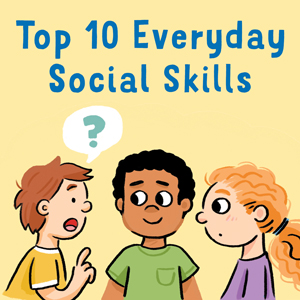Customer Services
Copyright © 2025 Desertcart Holdings Limited
Desert Online General Trading LLC
Dubai, United Arab Emirates










Social Skills Activities for Kids: 50 Fun Exercises for Making Friends, Talking and Listening, and Understanding Social Rules



K**M
Helpful Resource
I highly recommend this as an added resource to build positive social skills for children. We have began utilizing this and I see a significant improvement in confidence.
A**R
Social Situations Clarified
The workbook style and the reading material was great. It allowed both parent and child to gain insight to social norms. Kindergarten to third grade would benefit from the situations presented. This book and parent involvement is greatly benefitting a 6 year old autistic child and a 2nd grader.
S**B
My child really learned from this!
I bought this for my 8 year old and I to work on together. She can be a little bossy and I wanted to give her solid social skills in a fun and non judgmental way. She loves doing this with me. We do a couple of pages a few times a week. I just got a call from her teacher today that she has seen a lot of improvement in her social skills in school. I am so happy!
D**A
Social Rules for Successful Schooldays
Glad to have this to activity book to share with my class. Wish I could buy one for each student as they are thoughtful and in-depth exercises to learn and understand Social Skills.One recommendation: I wish there were activities to navigate through bullying scenarios successfully. Activity 37 What Do I Stand For? mentions it as one of the values to check or not (I am not a bully and I don’t join in on bullying.) but I did not see an activity on it. My apologies if I missed it.
N**E
Great Activities
I use this in my outpatient practice as a therapist with youth. There are some really great activities in this!
C**R
Could Be Relevant for Up to 12 Years - some written responses in workbook
With 130+ pages, this is a great summer book as children get into the more social grades. Even mentions texting (don’t repeatedly), maybe more. I can see some children engaged with it up to 8th grade if only to do a check in on their own experiences and actions. I believe good in building confidence.
C**Y
Exactly as described.
Arrived on time & is exactly as described. Seems to be helping my grandsons. No complaints
R**K
Overall good, BUT…
I use this book with my kids (6, 8, and 10) as part of our homeschool curriculum. We just talk through it and don’t use the writing space. Overall it has been helpful - for all of us! I have social anxiety and this has been a very useful tool. My kids are neurodiverse and they have also been learning useful skills from it. However, I was bothered by the “making eye contact” bit. As we learn more about neurodivergence and become a more inclusive society we really need to get away from that being considered a respectful/preferred trait. Those with autism, anxiety, or a history of trauma may not be capable of maintaining eye contact - and that should not be considered a fault.My other problem with the book is the short section regarding “sensitive” persons. As a highly sensitive person (HSP) myself, I understand why the author would want to address this, and some of the content within those lessons was helpful. But I’m not sure how much the author has actually studied HSPs, or maybe she’s trying to pull in some common pitfalls of certain personality disorders, but in some places she seems to confuse “sensitive” with selfish. My children all scored high on the sensitive “quiz,” but none of them identified with the sensitive “rules,” which honestly seemed more from an entitled perspective of a transactional relationship rather than the unreasonable feelings/fears of a sensitive person in a real friendship. In other places she labels something as rude if you do it, but if someone else does the same thing and it bothers you then you are “sensitive.” My primary concern is that children, particularly girls, will internalize that they are overly sensitive and excuse people crossing their boundaries or even abusing them. I think it would be better to point out what to do with our sensitive feelings when they are truly unreasonable in social situations. That was probably the goal here, but it really missed the mark.
Trustpilot
2 weeks ago
2 months ago